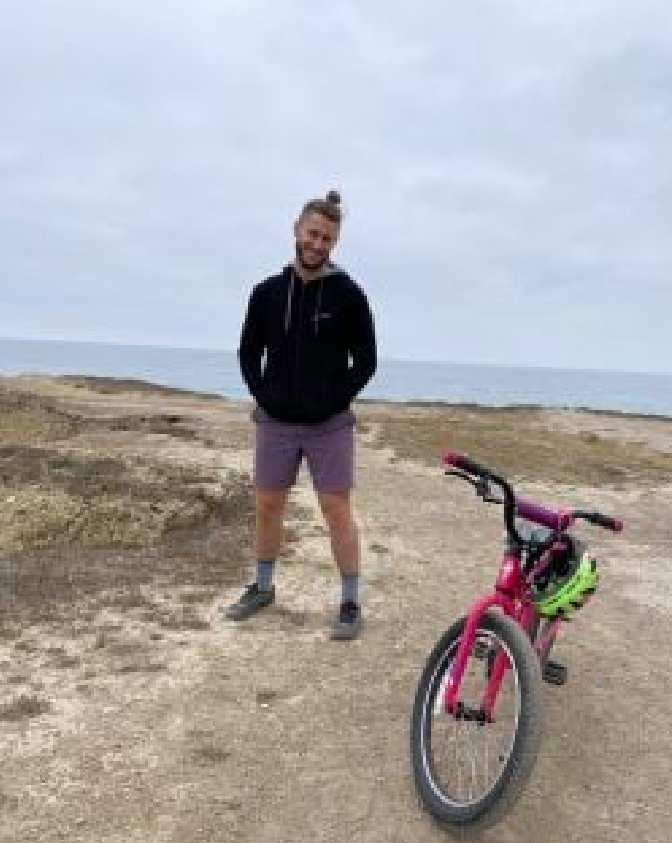Have you ever heard of regenerative parenting?
Let’s start with a different question. What isn’t regenerative?
I was inspired by this podcast with Tiokasin Ghosthorse of the Cheyenne River Lakota Nation. Tiokasin’s words have deeply impacted me as I’ve begun re-envisioning my exploration of Earth-based relating.
Regenerative parenting is not allowing my life force to be drained until I’m a translucent shell of the human I once was. It is not cowering in the shadow of a potential tantrum.
It is not sacrificing all that I am to a screaming, food-throwing blood sacrifice, demanding angelic demon that steals my sleep and sh*ts on my clothes.
It is also not ignoring the innocent pleas for love formed as the sometimes-not-so-sweet-sounding sonic eruptions emerging from the being I committed to support by taking on the role of a father.
Regeneration doesn’t happen in isolation—it emerges from systems of symbiotes.
Trees, mycelium, plants, insects, and animals feed and are fed, live, and die within the regenerative system we know as a forest. The needs of these forest dwellers are met through their relationship(s) and interaction(s) with those who dwell alongside them.
What happens when beings hole themselves up in little boxes and pretend to be self-sufficient in isolation?
This isn’t a theoretical question. This was me, my life, and my home. It was not regenerative. It was exhausting.
Fatigue led to burnout. Burnout led to escape. Escape led to divorce. Divorce led back to the beginning. Regeneration.
Losing the cushion of my ex-wife’s presence confronted me with the reality of my predicament: I didn’t know how to be me as a dad.
I clung to a lost archetype of myself—disconnected from the feelings of the moment, terrified of what feeling them would mean. I was terrified of being responsible for myself.
I resented my child’s needs because I was not taking responsibility for meeting my own. She felt like a vampire sucking my life force because my cup was empty. I was failing to replenish myself to sustain us both.
Within a regenerative system, all components are responsible for their unique role.
I am no exception to this rule. If I want to feel whole and connected to the system I exist within, I’ve got to honor my needs. To honor my needs, I’ve got to respect and listen to my own experience just as much as I need to respect and listen to those of my child. I’ve got to become an advocate for us as a system.
This means embracing the reality that I can’t stand my daughter’s chirping of the same three lines from “Frozen” a moment longer (it’s been 30 minutes nonstop). In that same moment, it means honoring the reality that I want to support her expression and musical talent.
Can you say conundrum? More often than not, parenting feels that way—a living paradox.
When it comes to “Frozen,” an earlier version of me as dad would have held my tongue, pretended to be fine with the situation, and emotionally vacated myself while continuing to be bombarded by the painfully repetitive, perfectly pitched waves of sound emitting from her small body.
I now know so much more that I didn’t know then.
Here is what a divorce (plus 2020 lockdowns) has revealed in my life:
>> Ignoring my needs sabotages my ability to nurture hers.
>> If I speak up (and also listen), I’m capable of creating boundaries that support a regenerative relationship where both people in the relationship have their needs met.
In the past, I’ve been reluctant to admit that I have needs at all.
I bought into the idea that being a good dad meant being a superhero—a boundlessly patient being, capable of withstanding the vast pressures of the world in order to nurture, provide for, and protect my child.
It turns out that the “Frozen” songs on repeat offered the kryptonite I needed to realize that my needs extend further than a cup of coffee and space to stretch my legs.
As the process of fathering has engulfed me, I’ve become more and more aware of my need for regenerative practices. I’ve found that I can easily become depleted. Work, relationships, laundry, driving, dishes, walking the dog—every interaction requires energy in the form of time, effort, and attention.
As I mentioned earlier, burnout has become a thing.
When I look to nature, I see cycles that are either regenerative or extinct. There doesn’t appear to be much in between (with the possible exception of industrialized human culture, but time will tell). I’ve come to see burnout as a friendly reminder that my ways of being are moving toward the extinction route.
It’s a sign that it’s time to change direction.
As much as I once tried to deny it, I need space to rest and recharge.
I need to slow down and receive support. Admitting and learning to embody this has been hard for me. I’ve been wired to anxiously move toward doing more—always.
I haven’t loved asking for help (truthfully, I’ve been terrified of rejection).
Burnout has been a friend more often than I care to admit.
Regenerative parenting is a practice of learning to curate dynamic relational balance. It’s not just about my little girl. It’s about everything that impacts my ability to show up and nurture her.
In developing this practice, I’ve become increasingly curious about what non-human entities can teach me about balancing the roles of provider, supporter, nurturer, and protector—all traits I associate with being a good dad—with all the other roles I have to embody day-to-day.
This exploration constantly reminds me of the lessons and wisdom offered free of charge by the original provider, supporter, nurturer, and protector (Earth). The more I learn to listen to the non-human voice of the being I reside with, the more present and available I feel to balance with the moment-to-moment chaos of parenting.
Regenerative parenting is a practice of taking full responsibility for my impact and expressing (with honest integrity) the impact I am experiencing.
It is sharing the experience of fathering with my daughter. It is witnessing her experience of being a child—my child. It is choosing to learn from our dynamic relational dance with compassion and allow understanding to emerge when it’s ready. It is letting go of what I think things “should” be like and accepting what they are like, especially when I don’t understand.
There’s no point in sugarcoating it. Parenting is challenging as f*ck. Regenerative practices don’t change that reality. They do create an environment in which ease and harmony can co-exist with the stress and dissonance inherent to dynamic relationships at large.
Regenerative parenting means showing up with grounded compassion. This requires a degree of care for the electrical systems of the body (the nervous system). If my nervous system is dysregulated, it’s likely I’ll be feeling symptoms of burnout. I will be quick to react and that will create tension that could have been avoided.
There’s a lot that could be said about the relational regulation of the nervous system. For tips and practices, I highly recommend checking out Resmaa Menakem’s book, My Grandmother’s Hands.
If there’s one area of life I’ve noticed to be equally or more triggering than parenting, it’s racial tension. In his book, Menakem offers strategies and practices for regulating within and through potential triggers (all triggered sensations emerge from the nervous system). I find everything I’ve learned through his work directly applicable to parenting.
I will offer a tip of my own as well. My go-to system for regulation practice is getting out in nature for some skin-to-skin with the big mama (Earth). When I’m at my best, this is happening daily.
Connecting to Earth as a practice supports me in de-escalating my nervous system’s state of arousal (calm the f*ck down and show up in a present, grounded way). It supports and tunes my immune system, my neural network, my motor network, and most every other aspect of my human system.
This practice supports me in being present and grounded. From this state, I’m able to more clearly choose how I want to show up moment-to-moment, rather than being constantly triggered and reactive.
When I am not taking time for this practice, I suffer. I get moody. I get cranky. I become prone to addictive or unconscious destructive patterns. My health suffers. My relationships suffer and my dog, Zeus, is bummed as f*ck.
Everyone connected to me benefits when I take the time to be in nature and do my thing. This practice is me taking responsibility for my own needs and meeting them in a supportive, health-promoting way.
That is regenerative.
My ideal natural setting is dirt, grass, sand, rock underfoot with undulating terrain and non-humans present. I recognize that this type of setting may not be accessible or even relaxing for others.
What zone/space/practice feels most relaxing to your nervous system?
What brings you a calm feeling, slows down your heart rate, and creates deeper, easier breaths?
Where are you not taking responsibility for (co)regulating and embracing regenerative practices in your relationships?
Where are you taking responsibility?
This exploration process has served me beyond measure.
I trust that it may serve you as well.
~









Read 0 comments and reply